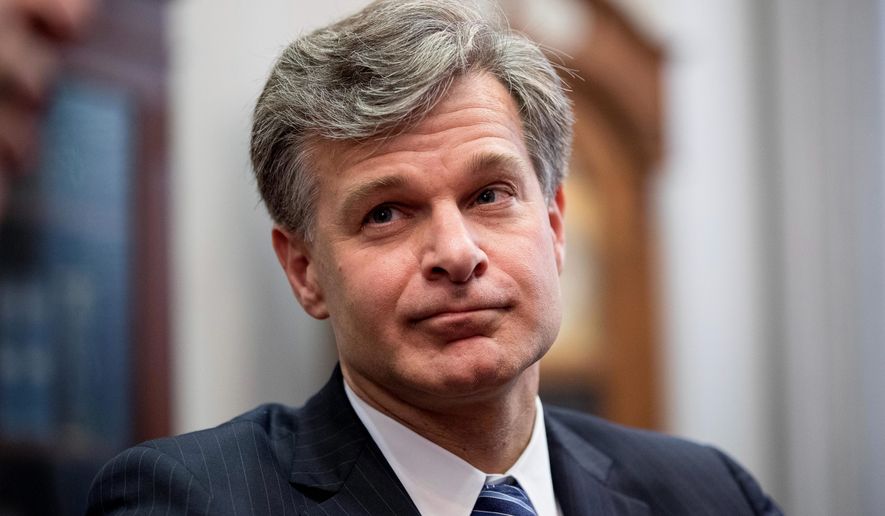President Trump’s nominee for FBI director led the Justice Department’s criminal division when 9/11 terrorist Zacarias Moussaoui pleaded guilty, and served as a personal attorney for New Jersey Gov. Chris Christie during the “Bridgegate” scandal.
But when asked to name the 10 most significant cases he’s litigated, Christopher Wray put the prosecution of former Atlanta Braves pitcher Pat Jarvis at the top of his list. Mr. Jarvis was convicted in 1999 of receiving kickbacks from companies he contracted with as a Georgia sheriff.
The disclosure was part of the questionnaire Mr. Wray submitted to the Senate Judiciary Committee ahead of his confirmation hearing next week.
Though former colleagues and legal opponents alike have described Mr. Wray as a consummate professional, Democrats are likely to use Wednesday’s hearing to seek assurances he will be able to withstand political pressure and act independently as the FBI provides the investigative muscle for the probe into Russian meddling in last year’s election.
Among other items disclosed in the filing are Mr. Wray’s personal net worth, which he said is close to $28 million and includes $16 million in securities assets and $4.5 million in real estate.
Mr. Wray last worked for the Justice Department in 2005, when he served as assistant attorney general in charge of the criminal division. Since then he has worked in private practice at the King & Spalding law firm, specializing in white-collar and regulatory matters.
But back when he oversaw the Jarvis case, which ended with a plea deal and a 15-month prison sentence, Mr. Wray was a federal prosecutor in Georgia. He worked under then-U.S. Attorney Sally Yates, who later rose to be deputy attorney general under President Obama, and served briefly as the acting head of the Justice Department before Mr. Trump fired her for refusing to defend his first travel ban order in January.
Mr. Wray, in his committee filing, did not explain why he felt the Jarvis case so significant.
“I’m happy to learn that it is,” said Craig Gillen, the lawyer who represented Mr. Jarvis.
Despite working opposite Mr. Wray on the Jarvis case, Mr. Gillen said he came away thinking highly of the prosecutor.
“Chris is someone who is very adept at listening. Most lawyers, myself included, probably do a lot more talking than the situation should warrant,” Mr. Gillen said. “He is a very balanced and has tremendous judgment.”
Mr. Wray also appeared deeply invested in his cases, according to another attorney who went head-to-head with Mr. Wray in the prosecution of Jay Ballinger, a serial arsonist who set fire to more than 30 churches across the country.
The Ballinger case was also listed among Mr. Wray’s most significant litigation. Even though Mr. Wray had left the U.S. attorney’s office and was working at the Justice Department in Washington by the time the case was appealed, he wrote that he “asked to handle the en banc proceedings personally, including oral argument before the full Eleventh Circuit.”
Paul Kish was an attorney with the Federal Defender Program who represented Ballinger, and argued that the case should have gone before the state, not federal court.
He recalled that Mr. Wray appeared very passionate about the case as he juggled preparation for the appeals with his new role handling the fallout from the 2001 terrorist attacks.
“Chris went to DOJ, 9/11 had happened, and he was having to file these extensions in the case: ’I have to handle the country’s response to 9/11. Can I have an extension?’” Mr. Kish recalled. “He got the extensions.”
The persistence paid off, and the 11th Circuit eventually ruled in Mr. Wray’s favor.
Mr. Wray, in his questionnaire, described handling counterterrorism and counterespionage cases as the biggest part of his workload at the Justice Department from 2003 to 2005, saying he worked closely with the FBI and U.S. attorneys across the country.
He counted the Moussaoui case, terrorist financing investigations and prosecutions against Colombian narco-terrorist groups such as FARC as among the most significant investigations he participated in.
Mr. Wray also noted in his answers that he had voiced support for a number of people nominated for Justice Department positions over the years, including Ms. Yates and former FBI Director James B. Comey, also fired by Mr. Trump this year.
More recently, Mr. Wray also joined with several other lawyers to support the nominations of Attorney General Jeff Sessions and Deputy Attorney General Rod Rosenstein. Mr. Wray also indicated he expressed support for the nomination of former Attorney General Eric H. Holder Jr.
Wray’s filing adds new insights into Trump’s pick for FBI
• Andrea Noble can be reached at anoble@washingtontimes.com.




Please read our comment policy before commenting.